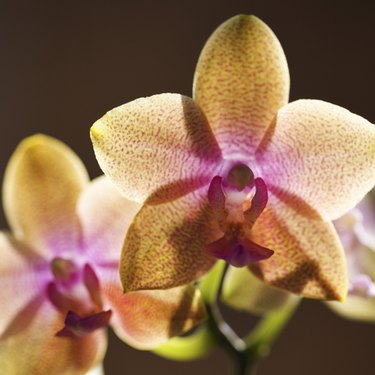
One fertilizer that many gardeners use on their orchids is Osmocote, a slow-release, granular fertilizer formulated both for both home and professional use. However, the debate on how to provide orchids with nutrients includes arguments for and against using fertilizer, and if you do use it, how much and what kind of fertilizer is appropriate for growing orchids professionally or in the home garden.
Recommendations
Video of the Day
Fertilizers labeled specifically for use with orchids make very specific timing and quantity recommendations to meet the needs of growing orchids. The reason these fertilizers are so specific is that many orchids fall into a group of plants that feed from the leaves, while the roots are anchoring mechanisms that don't absorb as much nutrition. Indeed, many orchids grow on the branches of trees, where there is little soil to hold nutrients at the roots for long. Over-fertilizing or improperly fertilizing orchids can result in damage or death to the plant.
Video of the Day
To Fertilize or Not
Some orchid growers maintain that gardeners should not fertilize orchids at all, while others recommend a steady regimen. The types of acceptable fertilizers range from organic to inorganic and slow-release to quick-release. However, gardeners have grown orchids with some degree of success using many combinations of these methods, including using Osmocote. The University of Florida Institute of Food and Agricultural Sciences as well as the Hillsborough County Extension recommend applying Osmocote 14-14-14 (nitrogen-phosphorus-potassium) at a rate of 1 tsp. per 6-inch pot every two to three months.
Warning
After application of Osmocote, any granules remaining on the orchid leaves will cause leaf damage. This is especially true for orchids that need frequent misting to keep the humidity high, since moisture releases the nutrients in the Osmocote. Direct contact with high concentrations of nitrogen and other nutrients contained in the Osmocote will leave a burn mark on the leaves. High concentrations of granules where the base of the leaf meets the plant may even disrupt nutrient flow to the rest of the leaf and kill the leaf and/or damage the base of the plant.
Considerations
The Osmocote Product Use Guide provided by The Scotts Company, LLC does not specifically recommend Osmocote for orchids. However, it does claim that Osmocote has a broad range of uses in caring for the nutrient needs of nursery plants. Local garden centers, growers or extension services often have further insights on using Osmocote on indoor or outdoor orchids and whether application rates should vary based on local climate.